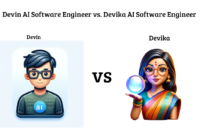Becoming a web developer can be a fulfilling and lucrative career choice in the digital age. As the internet continues to shape the world, web developers play a crucial role in designing, building, and maintaining websites and web applications. Whether you’re a tech enthusiast looking to transition into a coding career or a creative mind eager to showcase your work online, this comprehensive guide will take you through the essential steps to become a proficient web developer. From learning the necessary programming languages to mastering modern frameworks and tools, follow these steps, and you’ll be well on your way to excelling in the dynamic world of web development.
- Understand the Role of a Web Developer: Before diving into the technical aspects, it’s essential to have a clear understanding of what a web developer does. Web developers are responsible for creating websites and web applications, implementing the functionality, designing user interfaces, and ensuring that the site performs optimally across different devices and browsers. They work closely with web designers, project managers, and clients to bring a vision to life through code.
- Learn HTML and CSS: HTML (Hypertext Markup Language) and CSS (Cascading Style Sheets) are the foundation of web development. HTML provides the structure of a webpage, while CSS controls its visual appearance and layout. Begin your journey by mastering the basics of HTML, such as headings, paragraphs, lists, and links, and then move on to CSS to style and position elements.
- Become Proficient in JavaScript: JavaScript is a versatile programming language that adds interactivity and dynamic elements to web pages. As a web developer, it’s essential to learn JavaScript thoroughly. Start with the basics, including variables, functions, and control structures. As you progress, explore more advanced concepts like DOM manipulation, AJAX, and asynchronous programming.
- Choose a Front-End Framework: Front-end frameworks, such as React, Angular, and Vue.js, offer powerful tools for building dynamic and responsive web applications. Choose one of these frameworks based on your preference and market demand. Front-end frameworks facilitate the development process and help you create interactive and feature-rich user interfaces.
- Master Back-End Development: Back-end development involves handling the server-side of web applications. You’ll need to learn a server-side programming language, such as Python, Ruby, PHP, or Node.js. Additionally, you’ll need to understand databases, such as MySQL, MongoDB, or PostgreSQL, to store and manage data. Working with back-end technologies allows you to create complex web applications that process and store user data securely.
- Get Familiar with Version Control: Version control systems, like Git, are essential tools for web developers. They enable collaboration, allow you to track changes to your code, and provide a safety net in case something goes wrong. Learn the basics of Git, including committing changes, branching, and merging, to become a more efficient and organized developer.
- Learn About Responsive Web Design: Responsive web design ensures that websites look and function optimally on various devices, including desktops, tablets, and smartphones. Mobile users constitute a significant portion of internet traffic, making responsive design crucial for user experience. Study responsive design principles and CSS frameworks like Bootstrap or Foundation to build websites that adapt gracefully to different screen sizes.
- Practice Projects and Build a Portfolio: Practice is key to becoming a skilled web developer. Work on various projects to apply your knowledge and gain hands-on experience. Create personal projects, contribute to open-source projects, or collaborate with others to showcase your skills and build an impressive portfolio.
Your portfolio is a visual representation of your abilities and achievements, making it an invaluable tool for securing job opportunities or freelance work. Include detailed project descriptions, code samples, and links to live websites or repositories in your portfolio to highlight your expertise.
- Participate in Coding Challenges and Hackathons: Engaging in coding challenges and hackathons can be a fun and rewarding way to test your skills, solve real-world problems, and network with other developers. These events offer an opportunity to think creatively, work under pressure, and showcase your ability to develop solutions quickly and efficiently.
- Stay Updated with Web Technologies: Web development is a constantly evolving field with new tools, libraries, and best practices emerging regularly. Stay up-to-date with the latest web technologies by following tech blogs, attending conferences, and joining web development communities. Being aware of industry trends and advancements will keep you competitive and ensure that you are using the most efficient tools for your projects.
- Consider Specialization and Advanced Topics: Web development offers various specializations, such as front-end development, back-end development, full-stack development, and more. Consider your interests and strengths to determine which area you want to specialize in.
Additionally, explore advanced topics like Progressive Web Apps (PWAs), WebAssembly, and GraphQL, as these technologies are shaping the future of web development. Specializing in cutting-edge technologies can set you apart in the job market and open up exciting career opportunities.
- Networking and Building Professional Relationships: Networking is crucial for career growth in any field. Attend web development meetups, conferences, and workshops to connect with fellow developers and industry professionals. Engaging with the community can lead to valuable insights, mentorship, and job opportunities.
Building professional relationships can also lead to potential freelance projects or collaboration opportunities. Consider creating a LinkedIn profile to showcase your skills and expand your professional network.
- Apply for Internships or Entry-Level Positions: As a beginner, gaining practical experience is essential for building your career as a web developer. Consider applying for internships or entry-level positions at web development agencies, tech startups, or established companies.
Internships provide you with exposure to real-world projects and mentorship from experienced developers. Even if it’s an unpaid internship, the hands-on experience and networking opportunities can be invaluable for your future career.
- Continuous Learning and Growth: Web development is a field that continuously evolves with technology. To stay relevant, commit yourself to continuous learning and improvement. Be open to feedback and constructive criticism, as it is essential for personal and professional growth.
Consider pursuing certifications or advanced degrees in web development or related fields to enhance your skill set and boost your marketability. Participate in online courses, workshops, and bootcamps to learn new technologies and refine your existing skills.
Conclusion: Becoming a web developer requires dedication, continuous learning, and a passion for solving problems through code. By learning HTML, CSS, JavaScript, choosing a front-end framework, mastering back-end development, using version control, understanding responsive web design, building a portfolio, participating in coding challenges, staying updated with web technologies, considering specialization, networking, applying for internships, and committing to continuous learning and growth, you’ll be well-prepared to embark on a successful career in web development.
Embrace the ever-changing landscape of web development, and let your creativity and technical prowess shine as you contribute to shaping the digital world. Remember that web development is not just about writing code; it’s about creating solutions that improve people’s lives, entertain, and connect communities. Through your dedication and passion, you can make a significant impact in the online world and leave your mark on the internet’s ever-expanding horizon.





